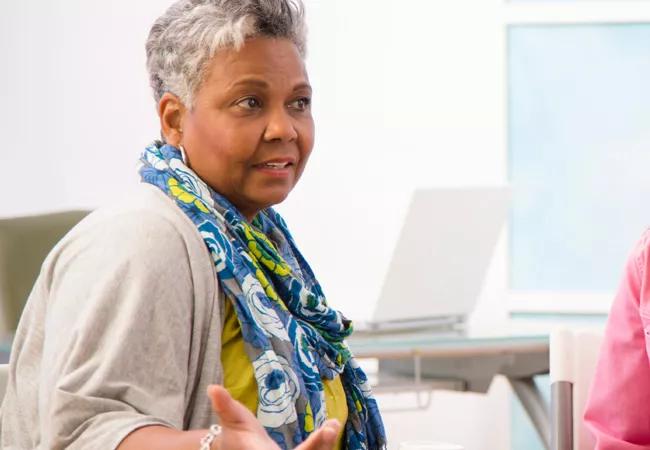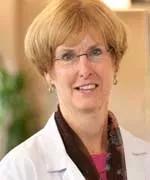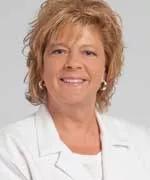Shared appointments address survivorship issues

Shared medical appointments (SMAs) are an innovative way to create appointment access and improve patient care. Cleveland Clinic’s SMA program began more than a decade ago. The healthcare system now has SMAs for patients in more than 20 areas of focus, ranging from chronic heart failure to skin conditions. Recently, Cleveland Clinic launched SMAs for breast cancer survivors at two locations, Cleveland Clinic’s Lyndhurst Campus and Fairview Hospital.
Advertisement
Cleveland Clinic is a non-profit academic medical center. Advertising on our site helps support our mission. We do not endorse non-Cleveland Clinic products or services. Policy
At Fairview Hospital, the breast cancer survivor SMA is held one Wednesday a month from 4:30 to 6 p.m. It’s led by Mary Longdon, MS, PA-C, and Jean Ellsworth-Wolk, MS, RN, AOCNS, coordinator of the cancer survivorship program at the Cleveland Clinic Cancer Center at Fairview Hospital. Four to eight women attend the SMAs, where they have short, individual clinical examinations then meet as a group to discuss common survivorship issues and receive education. At the Lyndhurst Campus, the breast cancer SMA is held every other week on Wednesdays from 5:30 to 7:30 p.m. for a total of seven visits. (The Lyndhurst Campus also offers a prostate cancer SMA for prostate cancer patients and survivors.)

Jean Ellsworth-Wolk, MS, RN, AOCNS
Part of the impetus for starting a breast cancer survivor SMA was in response to mandatory standards related to survivorship. In 2012, the Commission on Cancer of the American College of Surgeons released its patient-centered Survivorship Care Planning standard to be phased in by 2019. More recently, the National Accreditation Program for Breast Centers (NAPBC) issued a set of standards in 2014 that include breast cancer survivorship care.
“Having shared medical appointments is just one idea for addressing the long-term care and education needs of this particular group of patients,” says Ellsworth-Wolk. “Their needs are very similar.” She and Longdon began offering the shared appointments last fall and have since tweaked them to best serve the needs of the group.
Advertisement
As the medical provider, Longdon meets with each patient privately, taking vital signs, checking medications and performing breast exams. Then all the women gather in a group where they share any questions and hear about some aspect of survivorship from Ellsworth-Wolk, who has taught a cancer survivorship class for six years. The topics she covers include:
“There’s a lot more education that takes place in this type of environment,” says Ellsworth-Wolk. “When a patient comes in for a private appointment, they don’t get an hour of education.” In addition, the women share ideas and learn from one another. “I am amazed at the emotional support they give one another,” she says. “They understand they are not alone.”

Mary Longdon, MS, PA-C
“SMAs vary significantly from one patient population to another,” says Longdon. “For instance, if you have a diabetes clinic, you don’t necessarily have to take patients out of the room. But because we’re doing breast exams, we have to include a private setting.” Longdon and Ellsworth-Wolk met many times with their team as they planned for the unique requirements of an SMA for breast cancer survivors. The team includes two experienced nurses dedicated to breast health, Patricia Huddleston, RN, and Paula Keating, RN, as well as administrative assistant Dana Stachowski. The team shares these tips for successfully launching an SMA:
Advertisement
The breast cancer survivor SMA at Cleveland Clinic is in its infancy, but shows great promise. “It’s been a great way to circle back with patients and review everything we’ve gone over during their treatment, but now focus on moving forward,” Longdon explains.
Perhaps more noteworthy is praise from patients, including these two comments: “It was more relaxed than a single appointment,” and “The shared appointment allows more time for discussion, which is good.”
Advertisement
Advertisement

First-of-its-kind research investigates the viability of standard screening to reduce the burden of late-stage cancer diagnoses

Global R&D efforts expanding first-line and relapse therapy options for patients

Study demonstrates ability to reduce patients’ reliance on phlebotomies to stabilize hematocrit levels

A case study on the value of access to novel therapies through clinical trials

Findings highlight an association between obesity and an increased incidence of moderate-severe disease

Cleveland Clinic Cancer Institute takes multi-faceted approach to increasing clinical trial access 23456

Key learnings from DESTINY trials

Overall survival in patients treated since 2008 is nearly 20% higher than in earlier patients